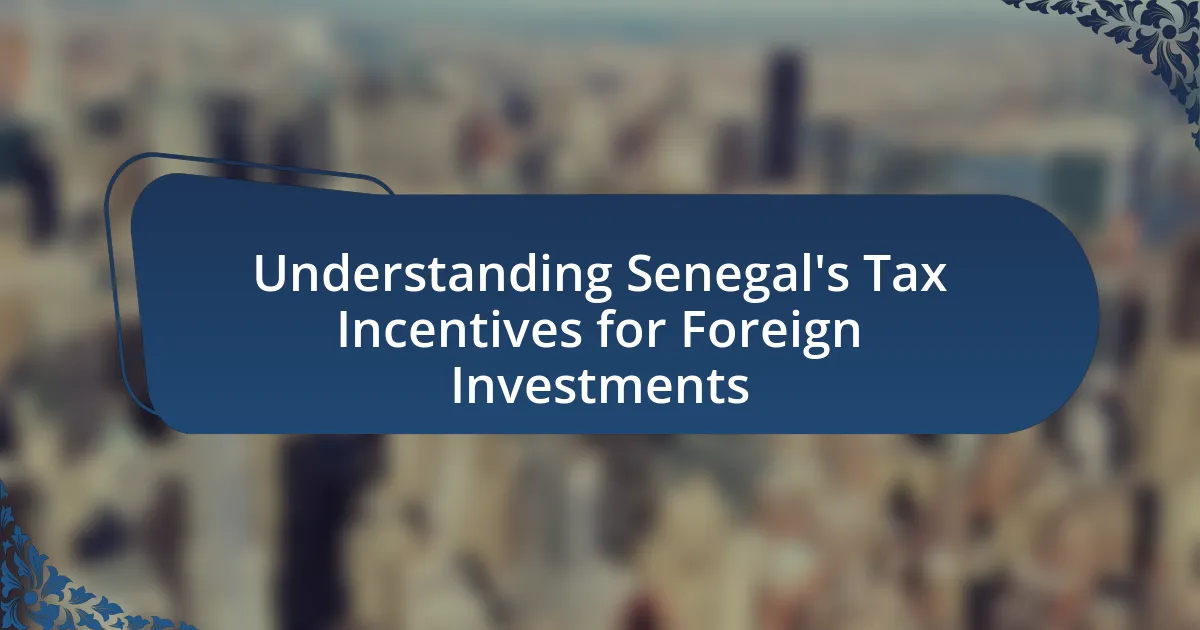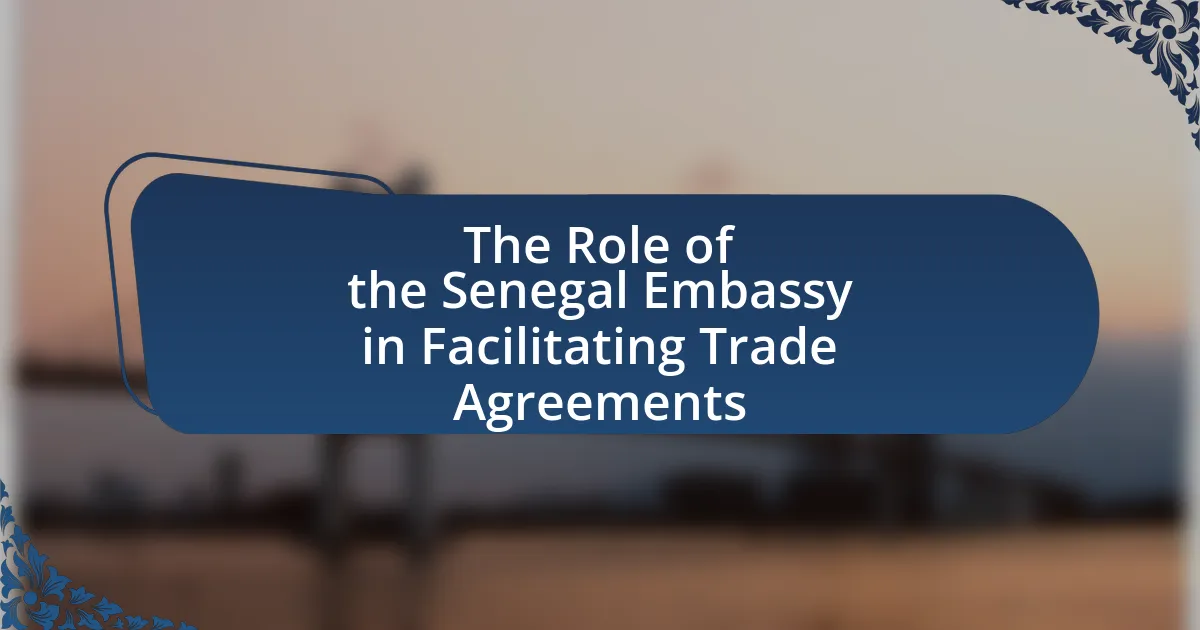Senegal’s trade policies are designed to promote exports, enhance competitiveness, and attract foreign investment, with a focus on diversifying the economy and reducing import dependency. Key components include tariff regulations, trade agreements, and investment incentives, which collectively create a favorable environment for investors. The article examines the impact of these policies on foreign investment, the specific regulations governing investment, and the challenges investors face, such as bureaucratic inefficiencies and inadequate infrastructure. Additionally, it highlights the importance of understanding local regulations and best practices for navigating Senegal’s trade landscape effectively.
What are Senegal’s Trade Policies?
Senegal’s trade policies focus on promoting exports, enhancing competitiveness, and attracting foreign investment. The government implements various measures, including tariff reductions, trade facilitation initiatives, and participation in regional trade agreements like the Economic Community of West African States (ECOWAS). These policies aim to diversify the economy, reduce dependency on imports, and stimulate growth in key sectors such as agriculture and mining. For instance, Senegal’s National Export Strategy outlines specific targets for increasing export volumes and improving trade infrastructure, which supports the overall objective of economic development and integration into global markets.
How do Senegal’s trade policies impact foreign investment?
Senegal’s trade policies significantly impact foreign investment by creating a favorable environment through incentives and regulatory frameworks. The government has implemented policies such as tax exemptions for certain sectors, streamlined customs procedures, and investment guarantees, which enhance the attractiveness of Senegal as a destination for foreign capital. For instance, the Senegalese government established the Investment Promotion and Major Projects Agency (APIX) to facilitate foreign investments, which has led to a reported increase in foreign direct investment (FDI) inflows, reaching approximately $1.2 billion in 2021. These measures demonstrate how Senegal’s trade policies actively encourage foreign investment by reducing barriers and providing financial incentives.
What specific regulations govern foreign investment in Senegal?
The specific regulations governing foreign investment in Senegal include the Investment Code, which provides a legal framework for foreign investors, ensuring protection and incentives. This code establishes the rights of investors, including guarantees against expropriation and the ability to repatriate profits. Additionally, the Senegalese government has implemented sector-specific regulations, particularly in areas such as mining, telecommunications, and agriculture, which may impose additional requirements or incentives. The regulatory environment is further supported by bilateral investment treaties that Senegal has signed with various countries, enhancing the protection of foreign investments.
How do tariffs and trade agreements influence investor decisions?
Tariffs and trade agreements significantly influence investor decisions by altering the cost structure and market accessibility for businesses. High tariffs can deter investment by increasing the cost of imported goods, making it less attractive for investors to enter a market. Conversely, favorable trade agreements can lower tariffs, enhance market access, and create a more predictable regulatory environment, encouraging investment. For example, the African Continental Free Trade Area (AfCFTA) aims to reduce tariffs among member countries, potentially attracting foreign direct investment by providing a larger, tariff-free market. This dynamic illustrates how tariffs and trade agreements directly impact the investment landscape by shaping the economic incentives for investors.
Why are Senegal’s trade policies important for investors?
Senegal’s trade policies are important for investors because they create a stable and predictable environment for business operations. These policies include incentives such as tax exemptions and reduced tariffs for foreign investors, which enhance the attractiveness of Senegal as an investment destination. For instance, the Senegalese government has implemented the Investment Code, which offers various benefits to foreign companies, including a 5 to 10-year tax holiday depending on the sector. Additionally, Senegal’s membership in the West African Economic and Monetary Union (UEMOA) facilitates access to a larger regional market, further increasing investment opportunities.
What economic sectors are most affected by these policies?
The economic sectors most affected by Senegal’s trade policies include agriculture, fisheries, and manufacturing. Agriculture is significantly impacted due to policies aimed at promoting local production and reducing imports, which can alter market dynamics and pricing. The fisheries sector faces regulations that aim to protect local fish stocks and promote sustainable practices, affecting both local fishermen and foreign investors. Manufacturing is influenced by tariffs and trade agreements that can either protect local industries or expose them to international competition, thereby shaping investment opportunities. These sectors are critical to Senegal’s economy, contributing to employment and GDP, and their responsiveness to trade policies is essential for understanding the overall economic landscape.
How do trade policies shape the business environment in Senegal?
Trade policies significantly shape the business environment in Senegal by influencing market access, investment attractiveness, and economic growth. For instance, Senegal’s membership in the West African Economic and Monetary Union (WAEMU) facilitates trade by eliminating tariffs among member states, thereby enhancing regional integration and allowing businesses to access a larger market. Additionally, the government’s implementation of the Senegal Emerging Plan (PSE) aims to attract foreign direct investment (FDI) through incentives such as tax breaks and streamlined regulatory processes, which further fosters a conducive environment for business operations. These policies collectively create a framework that encourages both local and international businesses to invest and expand in Senegal, ultimately contributing to the country’s economic development.
What are the key components of Senegal’s Trade Policies?
The key components of Senegal’s trade policies include tariff regulations, trade agreements, export promotion, and investment incentives. Senegal employs a tariff system that generally adheres to the Economic Community of West African States (ECOWAS) Common External Tariff, which aims to facilitate intra-regional trade while protecting local industries. The country has established various trade agreements, such as the African Continental Free Trade Area (AfCFTA), to enhance market access and reduce trade barriers. Additionally, Senegal actively promotes exports through initiatives like the Export Promotion Agency, which supports local businesses in reaching international markets. Investment incentives, including tax exemptions and special economic zones, are designed to attract foreign direct investment, further bolstering the economy. These components collectively aim to create a conducive environment for trade and investment in Senegal.
What types of trade agreements does Senegal engage in?
Senegal engages in several types of trade agreements, including bilateral, regional, and multilateral agreements. Bilaterally, Senegal has trade agreements with countries such as France and the United States, aimed at enhancing trade relations. Regionally, Senegal is a member of the Economic Community of West African States (ECOWAS), which facilitates trade among member states through reduced tariffs and trade barriers. Additionally, Senegal participates in the African Continental Free Trade Area (AfCFTA), which aims to create a single market for goods and services across Africa, promoting intra-African trade. These agreements are designed to boost economic growth and attract foreign investment by providing a more favorable trade environment.
How do bilateral and multilateral agreements benefit investors?
Bilateral and multilateral agreements benefit investors by providing enhanced market access and reducing trade barriers. These agreements facilitate smoother trade flows by lowering tariffs and simplifying customs procedures, which can lead to increased profitability for investors. For instance, the African Continental Free Trade Area (AfCFTA) aims to create a single market for goods and services across Africa, potentially boosting intra-African trade by 52.3% by eliminating tariffs on 90% of goods. Additionally, such agreements often include protections for foreign investments, ensuring that investors have legal recourse in case of disputes, thereby increasing the overall stability and attractiveness of the investment environment.
What role do regional trade organizations play in Senegal’s trade policies?
Regional trade organizations significantly influence Senegal’s trade policies by facilitating access to larger markets and promoting economic integration. These organizations, such as the Economic Community of West African States (ECOWAS), help Senegal align its trade regulations with regional standards, enhancing competitiveness. For instance, ECOWAS promotes the free movement of goods and services among member states, which directly impacts Senegal’s export strategies and trade agreements. Additionally, regional trade organizations provide a platform for negotiation and collaboration, enabling Senegal to address trade barriers and improve its trade relations with neighboring countries.
How does Senegal’s trade policy framework support economic growth?
Senegal’s trade policy framework supports economic growth by promoting export diversification and enhancing competitiveness. The government has implemented policies aimed at reducing trade barriers, such as tariffs and non-tariff measures, which facilitate access to international markets. For instance, Senegal’s participation in regional trade agreements, like the Economic Community of West African States (ECOWAS), allows for preferential trade terms that boost exports. Additionally, the establishment of special economic zones has attracted foreign direct investment, further stimulating economic activity. According to the World Bank, Senegal’s trade policies have contributed to a steady increase in GDP growth, averaging around 6% annually over the past decade, demonstrating the effectiveness of these strategies in fostering economic development.
What incentives are available for foreign investors in Senegal?
Foreign investors in Senegal can benefit from several incentives, including tax exemptions, customs duty exemptions, and access to special economic zones. The Senegalese government offers a tax exemption for up to seven years for new investments in priority sectors such as agriculture, tourism, and renewable energy. Additionally, customs duties on imported equipment and raw materials are often waived to encourage investment. Special economic zones provide further advantages, including simplified administrative procedures and additional tax benefits. These incentives are designed to attract foreign capital and stimulate economic growth in the country.
How does the government promote exports and imports?
The government promotes exports and imports through various policies and initiatives aimed at enhancing trade competitiveness. These include providing financial incentives such as tax exemptions and subsidies for exporters, establishing trade agreements to reduce tariffs, and investing in infrastructure to facilitate logistics and transportation. For instance, Senegal has engaged in regional trade agreements like the Economic Community of West African States (ECOWAS) to improve market access for its goods. Additionally, the government supports trade promotion agencies that assist businesses in navigating international markets and complying with export regulations.
What challenges do investors face in Senegal’s trade landscape?
Investors in Senegal’s trade landscape face several challenges, including bureaucratic inefficiencies, regulatory unpredictability, and inadequate infrastructure. Bureaucratic inefficiencies manifest in lengthy customs procedures and complex import/export regulations, which can delay transactions and increase costs. Regulatory unpredictability arises from frequent changes in trade policies and tariffs, making it difficult for investors to plan long-term strategies. Additionally, inadequate infrastructure, such as poor transportation networks and limited access to reliable utilities, hampers the movement of goods and increases operational challenges for businesses. These factors collectively create a challenging environment for investors looking to engage in Senegal’s trade sector.
What are the common barriers to trade in Senegal?
Common barriers to trade in Senegal include high tariffs, bureaucratic inefficiencies, and inadequate infrastructure. High tariffs can increase the cost of imported goods, making them less competitive in the local market. Bureaucratic inefficiencies, such as lengthy customs procedures and regulatory hurdles, can delay the import and export processes, discouraging trade. Additionally, inadequate infrastructure, including poor transportation networks and limited access to ports, hampers the movement of goods, further complicating trade activities. These factors collectively create significant challenges for businesses looking to engage in trade within Senegal.
How do bureaucratic processes affect trade efficiency?
Bureaucratic processes significantly hinder trade efficiency by introducing delays and increasing costs associated with compliance and regulation. In Senegal, for instance, lengthy customs procedures and complex documentation requirements can lead to extended waiting times for goods at ports, which negatively impacts supply chain timelines. According to the World Bank’s “Doing Business 2020” report, Senegal ranks 123rd out of 190 countries in terms of trading across borders, highlighting the inefficiencies caused by bureaucratic red tape. These inefficiencies can deter foreign investment and reduce the competitiveness of local businesses in the global market.
What risks should investors be aware of in Senegal’s market?
Investors in Senegal’s market should be aware of political instability, currency fluctuations, and regulatory challenges. Political instability can arise from changes in government or civil unrest, impacting investment security. Currency fluctuations pose risks due to the West African CFA franc’s fixed exchange rate to the euro, which can affect profitability for foreign investors. Regulatory challenges include bureaucratic inefficiencies and a lack of transparency in business practices, which can hinder operations and increase costs. These factors collectively create an environment that requires careful consideration and risk management for potential investors.
How can investors navigate Senegal’s trade policies effectively?
Investors can navigate Senegal’s trade policies effectively by understanding the regulatory framework and leveraging local partnerships. Senegal’s trade policies are influenced by its membership in the West African Economic and Monetary Union (WAEMU) and the Economic Community of West African States (ECOWAS), which provide a common external tariff and facilitate regional trade. Additionally, investors should familiarize themselves with the Senegalese Investment Code, which offers incentives such as tax exemptions and customs duty reductions for certain sectors. Engaging with local businesses and government agencies can provide insights into compliance requirements and market dynamics, enhancing the likelihood of successful investment.
What strategies can investors employ to mitigate risks?
Investors can employ diversification, hedging, and thorough due diligence to mitigate risks. Diversification involves spreading investments across various asset classes or sectors to reduce exposure to any single investment’s poor performance. For instance, a portfolio that includes stocks, bonds, and real estate can lower overall risk. Hedging strategies, such as options or futures contracts, allow investors to protect against potential losses in their primary investments. Additionally, conducting thorough due diligence, including analyzing market conditions, regulatory environments, and economic indicators, helps investors make informed decisions and anticipate potential risks. These strategies are supported by historical data showing that diversified portfolios tend to perform better during market downturns, as evidenced by studies from financial institutions like Vanguard and BlackRock.
How can understanding local regulations enhance investment success?
Understanding local regulations enhances investment success by ensuring compliance, minimizing risks, and optimizing operational strategies. In Senegal, for instance, knowledge of trade policies, tax incentives, and labor laws allows investors to navigate the business environment effectively. According to the World Bank’s “Doing Business 2020” report, countries with clear regulatory frameworks attract more foreign direct investment, as investors feel secure in their operations. This understanding enables investors to leverage opportunities such as tax breaks or grants offered by the Senegalese government, ultimately leading to higher profitability and sustainable growth.
What best practices should investors follow when engaging with Senegal’s trade policies?
Investors should conduct thorough research on Senegal’s trade policies, focusing on regulations, tariffs, and incentives. Understanding the legal framework, such as the Investment Code of Senegal, which offers tax exemptions and guarantees for foreign investments, is crucial. Additionally, engaging with local partners can provide insights into navigating the regulatory landscape effectively. Investors should also stay informed about changes in trade agreements, such as the African Continental Free Trade Area (AfCFTA), which can impact market access. Regularly consulting with trade experts and local chambers of commerce can further enhance compliance and strategic positioning in the Senegalese market.





